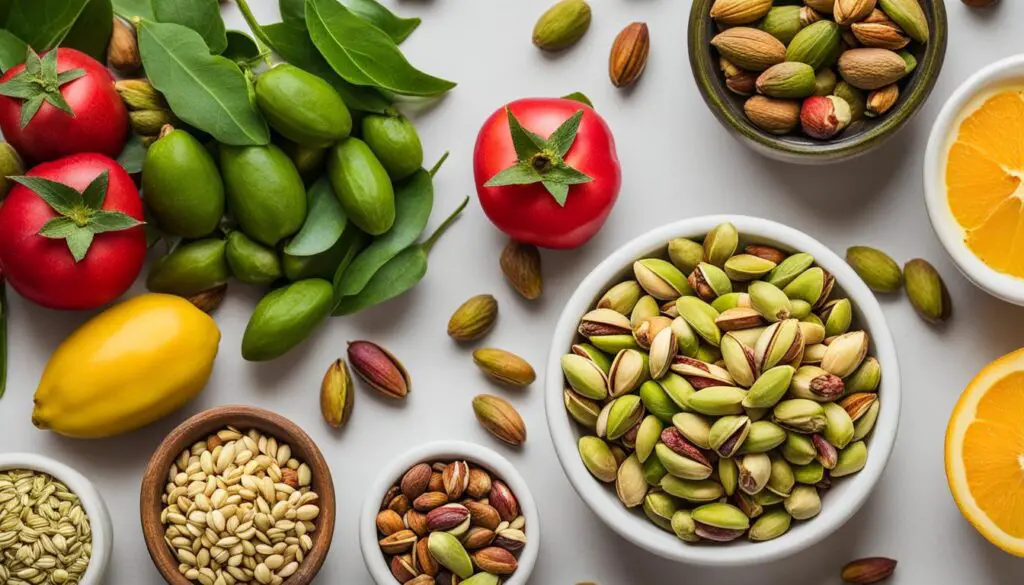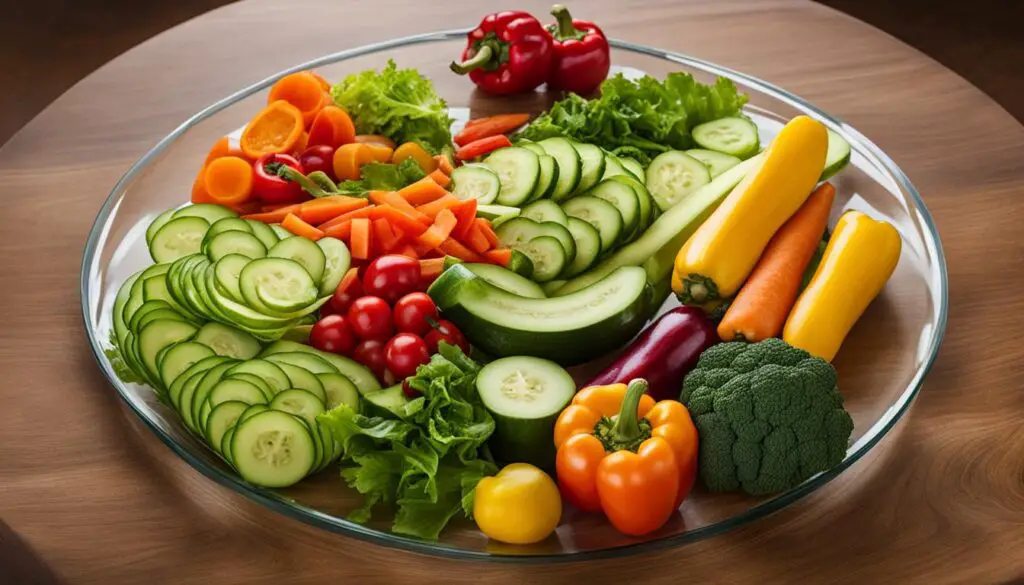When it comes to the relationship between pistachios and kidney stones, there are many myths and misconceptions. However, the scientific evidence indicates that pistachios do not directly cause kidney stones. In fact, research suggests that pistachios can be part of a healthy diet and may even have protective effects against kidney stone formation. Let’s delve deeper into the facts and debunk the myths surrounding the link between pistachios and kidney stones.
Key Takeaways:
- Pistachios do not directly cause kidney stones, as supported by scientific evidence.
- Research suggests that pistachios can be part of a healthy diet and may even have protective effects against kidney stone formation.
- It is important to distinguish between myths and facts when discussing the link between pistachios and kidney stones.
- Consulting with a healthcare professional or registered dietitian for personalized dietary recommendations is advisable for kidney stone prevention.
- Maintaining a balanced diet and healthy lifestyle practices are key factors in preventing kidney stone development.
Understanding Kidney Stones and Their Causes
Before discussing the potential impact of pistachios on kidney stones, it’s important to understand what kidney stones are and how they form. Kidney stones are hard, mineral deposits that can develop in the kidneys. There are several types of kidney stones, including calcium oxalate stones, which are the most common. Other types include uric acid stones, struvite stones, and cystine stones. The formation of kidney stones is complex and influenced by various factors, such as urine concentration, pH levels, and the presence of certain substances in the urine. Common risk factors for kidney stones include dehydration, a diet high in sodium and oxalate, certain medical conditions, and a family history of kidney stones.
Understanding the formation of kidney stones can provide insights into how certain dietary choices may or may not contribute to their development. By considering the types and causes of kidney stones, we can evaluate the potential impact of pistachios on kidney stone risk and separate fact from fiction.
| Type of Kidney Stone | Composition | Prevalence |
|---|---|---|
| Calcium Oxalate Stones | Calcium oxalate | Most common |
| Uric Acid Stones | Uric acid | Common in people with high uric acid levels |
| Struvite Stones | Magnesium ammonium phosphate | Associated with urinary tract infections |
| Cystine Stones | Cystine | Rare, genetic disorder |
As seen in the table above, calcium oxalate stones are the most prevalent. These stones can form when calcium and oxalate levels in the urine are imbalanced. The risk of developing kidney stones can be influenced by various factors, and understanding these factors is crucial to implementing preventive measures.
In the next section, we will debunk the myths surrounding the link between pistachios and kidney stones and examine the scientific evidence to provide a comprehensive understanding of the topic.
Debunking the Pistachio Myth
Despite popular belief, there is no direct evidence to suggest that pistachios can cause kidney stones. In fact, multiple studies have shown that pistachios have a relatively low oxalate content compared to other foods commonly associated with kidney stones, such as spinach and rhubarb. Oxalates are compounds that can bind with calcium in the urine to form calcium oxalate stones.
While pistachios do contain some oxalates, the levels are not significant enough to contribute to stone formation in most individuals. Contrary to the misconception, consuming pistachios as part of a balanced diet can even have potential benefits for kidney health.
Studies on pistachios and kidney stones have demonstrated that pistachios are a good source of various essential minerals, including potassium, magnesium, and phosphorus. These minerals play a vital role in maintaining overall kidney health and function. Additionally, the fiber content in pistachios can help promote healthy digestion, which is beneficial for kidney stone prevention.
It’s important to note that individual dietary needs may vary, and those with specific medical conditions or a history of certain types of kidney stones should consult with their healthcare provider for personalized dietary recommendations. Nevertheless, for the average person, including pistachios as part of a well-rounded diet can be a nutritious and enjoyable way to support overall kidney health.
Potential Benefits of Pistachio Consumption
Pistachios offer numerous health benefits and can be part of a nutritious diet. They are rich in healthy fats, fiber, and antioxidants, which can promote heart health, reduce the risk of diabetes, and even potentially lower the risk of certain types of cancer. By including pistachios as part of a balanced diet, individuals may see improvements in cholesterol levels, blood sugar control, and overall well-being. These benefits apply to the general population and are particularly relevant for individuals with kidney stone concerns, as a healthy diet can help prevent stone formation.

One of the significant health benefits of pistachio consumption is their positive impact on heart health. Pistachios are high in monounsaturated and polyunsaturated fats, which are known to help lower LDL cholesterol levels, often referred to as ‘bad’ cholesterol. By replacing unhealthy saturated fats with pistachios, individuals can support cardiovascular health and reduce the risk of heart disease.
Pistachios also have a positive effect on blood sugar control, making them an excellent choice for individuals with diabetes or those at risk of developing the condition. The combination of healthy fats, fiber, and protein in pistachios allows for slower digestion and absorption of carbohydrates, preventing sharp rises in blood sugar levels. Incorporating pistachios into meals or snacks can help stabilize blood sugar and contribute to overall glycemic control.
Furthermore, emerging research suggests that pistachios may play a role in cancer prevention. These nuts are rich in antioxidants, including vitamin E, lutein, and zeaxanthin, which can help neutralize harmful free radicals in the body and protect against cellular damage. Studies have indicated that regular consumption of pistachios may help reduce the risk of certain cancers, such as colorectal and lung cancer.
In summary, including pistachios in your diet can provide a range of health benefits, including promoting heart health, aiding in blood sugar control, and potentially reducing the risk of certain types of cancer. These benefits make pistachios a valuable addition to a balanced and nutritious eating plan, benefiting both the general population and individuals with kidney stone concerns.
Maintaining a Healthy Diet for Kidney Stone Prevention
While pistachios are not a direct cause of kidney stones, following a healthy diet is crucial in reducing the risk of stone formation. By incorporating the right foods and making smart choices, you can actively prevent the development of kidney stones. Here are some tips:
Foods to Include for Kidney Stone Prevention
- Increase your water intake: Staying hydrated is essential for preventing kidney stones. Aim to drink at least 8-10 glasses of water per day to keep your urine diluted and reduce the concentration of stone-forming substances.
- Consume enough calcium: Contrary to popular belief, adequate calcium intake can actually help prevent kidney stones. Include calcium-rich foods in your diet like dairy products, leafy greens, and fortified plant-based milks.
- Choose foods high in citrate: Citrate helps prevent the formation of kidney stones by binding with calcium and inhibiting stone formation. Citrate-rich foods include lemons, oranges, melons, and certain types of berries.
- Opt for a low-sodium diet: High sodium intake can increase calcium levels in your urine, leading to stone formation. Limit your consumption of processed foods, canned soups, and fast food, which are often high in sodium.
Foods to Avoid for Kidney Stones
- Avoid excessive oxalate consumption: Consuming foods high in oxalates can contribute to the formation of calcium oxalate stones. Limit or avoid foods such as spinach, rhubarb, beets, nuts, and chocolate.
- Limit sodium intake: High sodium levels in your diet can cause increased calcium excretion, which can lead to stone formation. Reduce your intake of table salt, processed foods, and fast food.
- Restrict animal protein: Animal protein can increase the excretion of calcium and other substances that contribute to stone formation. Moderate your intake of meat, poultry, and seafood.
- Limit soda and sugary drink consumption: Frequent consumption of sugary beverages can increase the risk of kidney stone formation, particularly those with high fructose corn syrup.
Tips for Kidney Stone Prevention
- Maintain a healthy weight: Obesity and excess weight can increase the risk of kidney stones. Adopt a balanced diet and engage in regular physical activity to maintain a healthy weight.
- Avoid crash diets: Rapid weight loss can lead to an increased concentration of calcium, oxalate, and uric acid in the urine, increasing the risk of stone formation. Gradual and steady weight loss is recommended.
- Limit alcohol consumption: Alcohol can contribute to dehydration, which increases the risk of stone formation. Consume alcohol in moderation and ensure adequate hydration.
- Quit smoking: Smoking is associated with an increased risk of kidney stone formation. Quitting smoking not only reduces the risk of kidney stones but also improves overall health.
By following these dietary tips and maintaining a healthy lifestyle, you can significantly reduce the risk of kidney stone formation. However, it’s important to consult with a healthcare professional or registered dietitian for personalized advice tailored to your specific needs and medical history.

| Food Group | Foods to Include | Foods to Avoid |
|---|---|---|
| Fluids | Water, herbal tea, citrus juices | Soda, sugary drinks, energy drinks |
| Calcium | Dairy products, leafy greens, fortified plant-based milks | – |
| Citrate | Lemons, oranges, melons, berries | – |
| Sodium | Unprocessed foods, low-sodium options | Processed foods, canned soups, fast food |
| Oxalate | – | Spinach, rhubarb, beets, nuts, chocolate |
| Animal Protein | Moderate intake | Excessive intake |
| Sugary Drinks | – | Soda, fruit juices with added sugars |
Conclusion
In conclusion, scientific evidence does not support the claim that pistachios directly cause kidney stones. In fact, when included as part of a healthy, balanced diet, pistachios can offer numerous health benefits without increasing the risk of kidney stone formation. It is crucial, however, to maintain a varied diet and adopt healthy lifestyle practices to effectively prevent kidney stone development.
While pistachios have a relatively low oxalate content compared to other foods associated with kidney stones, it’s important to note that individual circumstances may vary. Consulting with a healthcare provider or registered dietitian can provide personalized advice based on specific needs and concerns.
By incorporating pistachios into a nutritious eating plan, individuals can benefit from their rich nutrient profile, which includes healthy fats, fiber, and essential minerals. Consuming pistachios as part of a diverse diet can support heart health, reduce the risk of diabetes, and potentially lower the risk of certain types of cancer.
Remember, maintaining a healthy diet and lifestyle is key to kidney stone prevention, and pistachios can be enjoyed as a tasty and nutritious snack within the context of an overall balanced eating plan.
FAQ
Do pistachios cause kidney stones?
No, there is no evidence to suggest that pistachios directly cause kidney stones. In fact, research indicates that pistachios have a relatively low oxalate content compared to other foods commonly associated with kidney stones.
What are kidney stones and how do they form?
Kidney stones are hard mineral deposits that can develop in the kidneys. They form as a result of various factors such as urine concentration, pH levels, and the presence of certain substances in the urine.
Are pistachios bad for kidney stones?
No, pistachios are not bad for kidney stones. They have a low oxalate content and can be part of a healthy, balanced diet.
What are the potential benefits of pistachio consumption?
Pistachios offer numerous health benefits, including promoting heart health, reducing the risk of diabetes, and potentially lowering the risk of certain types of cancer.
How can a healthy diet help prevent kidney stone formation?
Maintaining a healthy diet that includes drinking plenty of water, consuming an adequate amount of calcium, and limiting sodium and oxalate intake can help reduce the risk of kidney stone formation.

